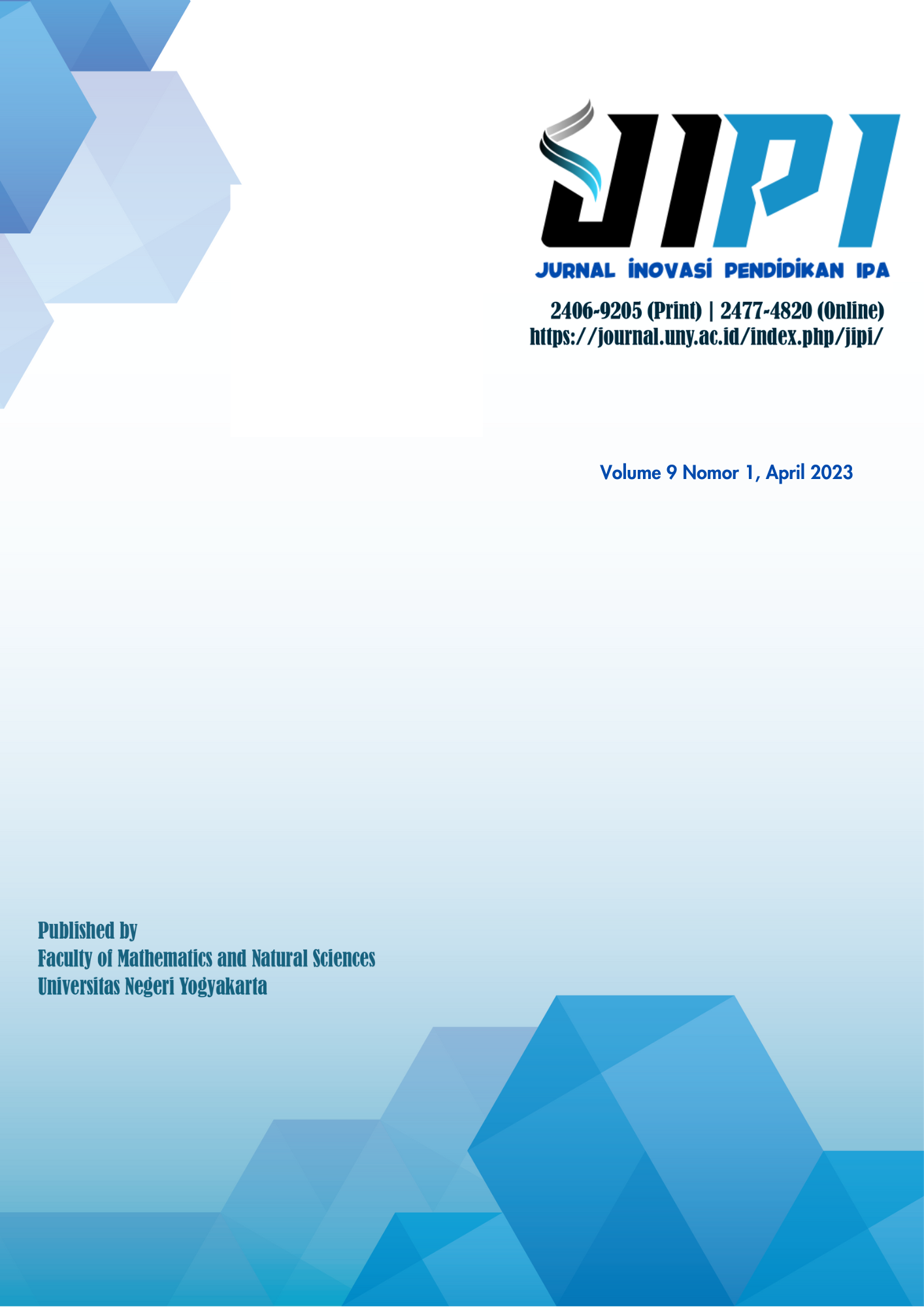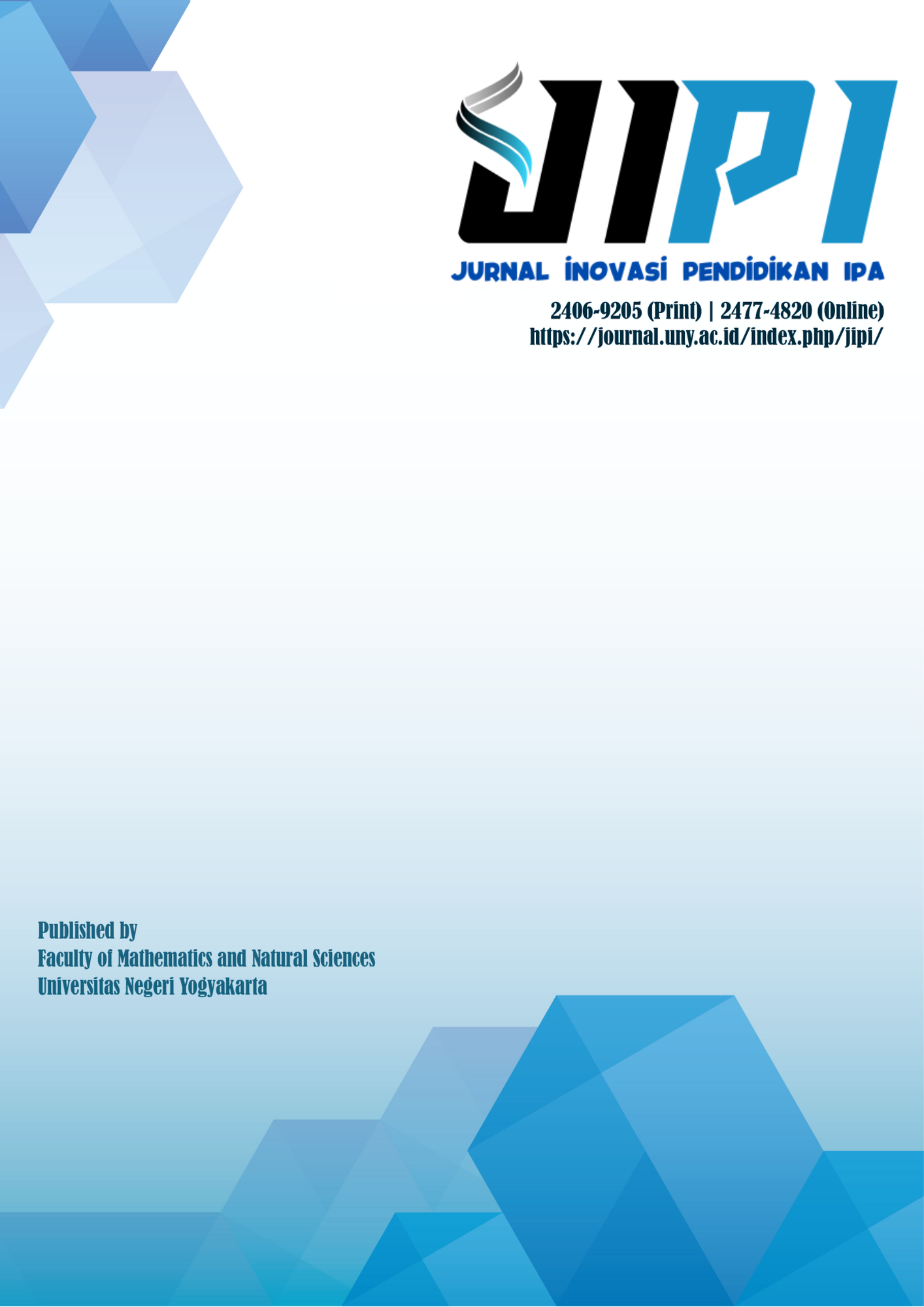Development of Mangrove Ecosystem E-encyclopedia as a Reference Source to Improve Information Literacy Skills and Environmental Care Attitudes of Students
DOI:
https://doi.org/10.21831/jipi.v8i1.48028Keywords:
E-encyclopedia, Mangrove Ecosystem, Reference Source, Information Literacy, Environmental Care AttitudeAbstract
This study aims to produce a development product that is feasible and effective to use for science learning in schools. The product developed is an e-encyclopedia of mangrove ecosystems. This study uses the Research and Development (R&D) model developed by Borg & Gall. The subjects of the limited trial consisted of 15 students of class VII. In comparison, the field trial consisted of 52 students from VII-G and VII-E of SMP IT Abu Bakar Yogyakarta. The data collection instruments included interviews, field observations, information literacy evaluation questions, and student environmental care attitude questionnaires. The field trial design used a pretest-posttest control group design. The results showed that: (1) the developed mangrove ecosystem e-encyclopedia is very suitable for use in science learning; (2) the e-encyclopedia of mangrove ecosystems is effective for improving students' information literacy skills and environmental care attitudes. Development of Mangrove Ecosystem E-encyclopedia as a Reference Source to Improve Information Literacy Skills and Environmental Care Attitudes of Students.
References
Abrori. (2018). Improving Reading Literacy Strategy through Seven Programs of Reading Interest c ontaining Da ' wah Message. Attarbiyah: Journal of Islamic Culture and Education, 3(2), 205–225. https://doi.org/10.18326/attarbiyah.v3i2.205-225
Ampa, A. T. (2015). The Implementation of Interactive Multimedia Learning Materials in Teaching Listening Skills. English Language Teaching, 8(12), 56. https://doi.org/10.5539/elt.v8n12p56
Asrizal, Desnita, & Darvina, Y. (2020). Need analysis to develop electronic enrichment book of Physics based on contextual teaching and environmental potential. Journal of Physics: Conference Series, 1481(1). https://doi.org/10.1088/1742-6596/1481/1/012123
Astra, I. M., & Saputra, F. (2018). The Development of a Physics Knowledge Enrichment Book "optical Instrument Equipped with Augmented Reality" to Improve Students' Learning Outcomes. Journal of Physics: Conference Series, 1013(1). https://doi.org/10.1088/1742-6596/1013/1/012064
Gyaase, P. O., Anokye-sarfo, A., & Bediako, Y. (2013). The Adoption Of Information And Communication Technology In The Public Sector; A Study Of The Financial Management In The Ghana Education Service (GES). International Journal of Scientific & Technology Research, 2(12), 327–335.
Harun, R., Hock, L. K., & Othman, F. (2011). Environmental knowledge and attitude among students in sabah. World Applied Sciences Journal, 14(SPL ISS 1), 83–87.
Istiqomah, I. (2019). Sikap Peduli Lingkungan Peserta Didik di MAN-1 Pekanbaru Sebagai Sekolah Adiwiyata. Dinamika Lingkungan Indonesia, 6(2), 95. https://doi.org/10.31258/dli.6.2.p.95-103
Kahar, A. P. (2018). Application of mangrove ecosystem material based on local potential to improve student's enviromental awareness attitude. Didaktika Biologi: Jurnal Penelitian Pendidikan Biologi, 2(1), 1–8.
Maulana, S., Desnita, D., & Raihanati, R. (2018). The Development of Knowledge Enrichment Books Concerning Ice and Snow Physical Studies for High-School Students. Jurnal Penelitian & Pengembangan Pendidikan Fisika, 4(2), 83–90. https://doi.org/10.21009/1.04205
Nasution, R. (2016). Analisis Kemampuan Literasi Lingkungan Siswa SMA Kelas X di Samboja dalam Pembelajaran Biologi. Proceeding Biology Education Conference, 13(1), 352–358. https://jurnal.uns.ac.id/prosbi/article/view/5746
Prasetyawan, Y. Y. (2018). Pengembangan Instrumen Pengukuran Kemampuan Literasi Informasi Berbasis Efikasi Diri (Self Efficacy). Anuva, 2(3), 273. https://doi.org/10.14710/anuva.2.3.273-279
Riski, L., Winoto, Y., & Rohman, A. S. (2018). Literasi Informasi Siswa Sekolah Menengah Pertama dalam Pengerjaan Tugas Sekolah. BIBLIOTIKA : Jurnal Kajian Perpustakaan Dan Informasi, 2(2), 132–140. https://doi.org/10.17977/um008v2i22018p132
Santika, I. W. E. (2020). Pendidikan Karakter pada Pembelajaran Daring. Indonesian Values and Character Education Journal, 3(1), 8–19.
Scott, D., Cheong, M., & Li, H. (2012). Web-based Construction Information Management System. Construction Economics and Building, 3(1), 43–52. https://doi.org/10.5130/ajceb.v3i1.2910
Supriadi, S. (2017). Pemanfaatan Sumber Belajar Dalam Proses Pembelajaran. Lantanida Journal, 3(2), 127. https://doi.org/10.22373/lj.v3i2.1654
Tanjung, R., Khakhim, N., & Rustadi, R. (2017). Kajian Fisik Pesisir Kulon Progo untuk Penentuan Zona Kawasan Mangrove dan Tambak Udang. Majalah Geografi Indonesia, 31(2), 22. https://doi.org/10.22146/mgi.26320
Wismarini, T. D., Budi, D., & Ningsih, D. H. U. (2012). Elektronik Ensiklopedi Tanaman Herba sebagai Bank Data Digital Tanaman Obat. Jurnal Teknologi Informasi DINAMIK, 17(2), 90–97.
Zeidan, A. H., & Jayosi, M. R. (2014). Science Process Skills and Attitudes toward Science among Palestinian Secondary School Students. World Journal of Education, 5(1), 13–24. https://doi.org/10.5430/wje.v5n1p13
Downloads
Published
How to Cite
Issue
Section
Citation Check
License
The authors submitting a manuscript to this journal agree that, if accepted for publication, copyright publishing of the submission shall be assigned to Jurnal Inovasi Pendidikan IPA (JIPI). However, even though the journal asks for a copyright transfer, the authors retain (or are granted back) significant scholarly rights.
Jurnal Inovasi Pendidikan IPA by http://journal.uny.ac.id/index.php/jipi/index is licensed under a Creative Commons Attribution-ShareAlike 4.0 International License.










